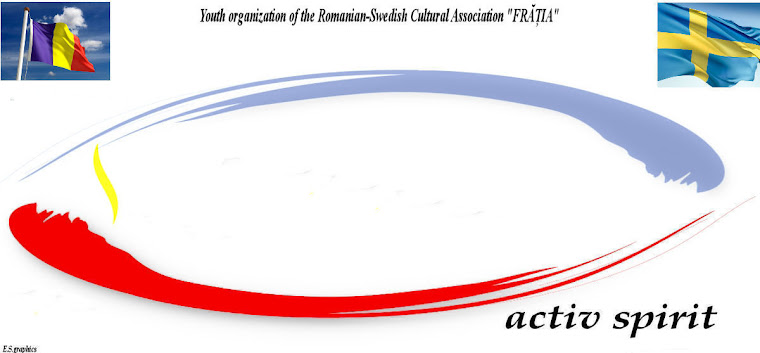Press release representing the viewpoint of the Romanian-Swedish Cultural Association "Frăţia"
Noting the emergence, more often lately, in the media in Sweden and Romania, of information which refer to some Romanian citizens of various nationalities, practicing beggary in Sweden, Romanian-Swedish Cultural Association "Frăţia" identified the need to express their views on this subject, considering that the said statements must be treated individually on a case by case, avoiding, as we think it is normal, avoiding confusion between all Romanians and begging - considered a crime in Romania and prosecuted by the Criminal Code - or networking Romanians as a nation, with other phenomena associated with begging.
Romanian-Swedish Cultural Association "Frăţia" emphasizes the need for individual efforts, institutional and from journalists, those who disseminate public information, in order to avoid such confusion could harm the image, dignity and interests of honest Romanians, integrated into Swedish society. Groups of beggars and vagrants were usually perceived as groups of criminals, matter which has no connection with ideas, values and behavior of most Romanians.
Romanian-Swedish Cultural Association "Frăţia" calls on all Romanians in Stockholm and throughout Scandinavia, and the media in Sweden and Romania, Romanian and Swedish institutions have the appropriate tools, to contribute in the spirit of respecting truth, to promote and defend an accurate image, the real core traditional values of the Romanian people.
Romanian-Swedish Cultural Association "Frăţia" considered important in this context be emphasized that the history and values of Romanians and their ancestors provides stable, with great sacrifices by at least 2,000 years, priceless treasures, for the European and world civilization.
Knowledge of the latter is, according to Romanian-Swedish Cultural Association "Frăţia" , a priority and represents a measure of accuracy and normality when referring to Romanian generally, to avoid any confusion.
Romanian-Swedish Cultural Association "Frăţia"considers important be known that never in its history so far, the Romanian people has experienced collective migration, being strongly attached to places where they were born, lived and sacrificed themselves for generations, keeping the identity and Latinity of Romanian language in a geographical area located at the crossroads of great empires interests and where Romanians have received and accepted to live with other nationalities that history has placed in Romanian space.
Reality that many Romanians currently working in Europe and worldwide, is the result of difficult, sometimes painful transitions towards new political-economic realities that are specific to XXI century but also an opportunity for most of them to demonstrate quality and value they can provide.
Industriousness, spirituality, culture, intelligence, innovation, altruism, courage, are traditional features of Romanians who have demonstrated these characteristics over time.
Viewpoint of the Romanian-Swedish Cultural Association "Frăţia" is that geniuses are representative of the Romanian people Romanian, not some individuals practicing occupations considered shameful, degrading, in the tradition and collective perception of Romanians.
Instead, Viewpoint of the Romanian-Swedish Cultural Association "Frăţia" calls for a genuine knowledge of Romanian qualities in a simple exercise in imagination.
Those traveling by plane can remember the Romanian Traian Vuia, author of the first self-propelled flight by a heavier-than-air, the scientist Henri Coanda, the Romanian who built the first jet, people visiting an art museum to remember the Romanian Constantin Brancusi, the father of modern sculpture. Sports lovers can remember Romanian Ilie Nastase, one of the greatest tennis player of all time, Romanian woman Nadia Comaneci, the first gymnast in the world who obtained a mark of 10, the Romanian Gheorghe Hagi, a value of world football. Those interested in medicine - can remember Romanian Nicolae Constantin Paulescu, the true discoverer of insulin, which the director of the Nobel Committee recognized the merit postmortem, Romanian woman Ana Aslan, who founded the first Institute of Geriatrics in the world, the inventor Gerovital .
The list goes to Romanian Emil Cioran largest nihilistic philosopher of the twentieth century, famous Romanian Mircea Eliade, philosopher and historian of religions, Stefan Odobleja, Romanian who is the father of cybernetics, biospeleological father, Romanian Emil Racoviţă, Romanian Eugene Ionesco, absurd theater genius,George Emil Palade American physician and scientist of Romanian origin, a specialist in cell biology, Nobel Prize in Physiology or Medicine in 1974, Romanian Gheorghe Zamfir pan flute famous king, John Stefan Basgan, the Romanian inventor who revolutionized the drilling oil shock, Adrian Bejan, one of the most appreciated Romanian engineer in the U.S., inventor of the constructal theory, Romanian soprano Angela Gheorghiu, soprano Mariana Nicolesco and famous mezzo-soprano Viorica Cortez, some of the most famous opera singer in the world, Dumitru Prunariu, the first Romanian cosmonaut, the 103 th man who arrived in space, Lazar Edeleanu, Romanian scientist who succeeded for the first time in the world refined petroleum products with sulfur dioxide, Romanian Carol Popp Szathmáry - first world war, photographer, George Enescu, the most important Romanian musician and one of the greatest composers of the twentieth century, Sergiu Celibidache, one of the most valuable musicians of the twentieth century, Romanian Mihai Cretu, also known as Michael Cretu, creator of the famous musical project Enigma, Dr. Eugen Pavel, Romanian inventor of Hyper CD-ROM drive with storage capacity of over 10,000 gigabytes, Romanian director Cristian Mungiu, winning the 2007 Palme d'Or at Cannes, etc..,
These are only a very small number of jewelry from the thousands of treasures of authentic Romanian spirit about that Romanian-Swedish Cultural Association "Frăţia" believe that are representative for Romanians in Scandinavia and elsewhere.
Romanian-Swedish Cultural Association "Frăţia"
President-Elena Borca
Subscribe to:
Comments (Atom)






